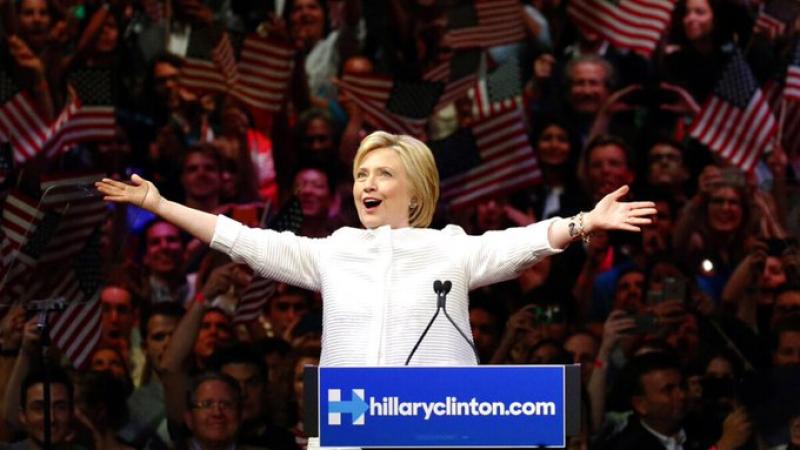Judge won't let Clinton collusion tweet be admitted in Sussmann trial
By: Washington Examiner



Hillary Clinton's tweet touting Trump-Russia collusion claims will not be allowed as evidence in the trial against Clinton campaign lawyer Michael Sussmann despite efforts by special counsel John Durham.
On Halloween 2016, Clinton tweeted, "Donald Trump has a secret server ... It was set up to communicate privately with a Putin-tied Russian bank."
Clinton later tweeted, "Computer scientists have apparently uncovered a covert server linking the Trump Organization to a Russian-based bank."
She also shared a lengthy statement by then-Clinton campaign adviser, and President Joe Biden's current national security adviser, Jake Sullivan.
"This could be the most direct link yet between Donald Trump and Moscow," Sullivan claimed. "This secret hotline may be the key to unlocking the mystery of Trump's ties to Russia."
Sullivan added, "We can only assume that federal authorities will now explore this direct connection between Trump and Russia."
On Wednesday, Judge Christopher Cooper, an Obama appointee, denied Durham's efforts to bring the tweet up at trial, saying "the court will exclude that as hearsay" and that "it's likely duplicative of other evidence" related to demonstrating the attorney-client relationship.
Sussmann was indicted in September for allegedly concealing his clients — Clinton's 2016 presidential campaign and "Tech Executive-1," former Neustar executive Rodney Joffe — from FBI general counsel James Baker in September 2016 when he pushed since-debunked claims of a secret back channel between the Trump Organization and Russia's Alfa-Bank. Sussmann has pleaded not guilty.
Durham had told the federal court earlier this month that he wanted the October 2016 tweet from the Clinton campaign promoting the Alfa-Bank claims to be admitted as evidence at the May trial.
The special counsel argued the tweet is not inadmissible hearsay "because it is not being offered for its truth" — emphasizing that the prosecutors actually believe its claims were false. Durham said he instead wanted to present the tweet to "show the existence of the defendant's attorney-client relationship with the Clinton Campaign, which is directly relevant to the false statement charge."
The FBI, CIA, special counsel Robert Mueller, a bipartisan Senate Intelligence Committee investigation, and Durham's team have all cast doubt on or shot down the Alfa-Bank claims.
Sussmann's lawyers argued the tweet sharing Sullivan's statement and touting the story should be considered inadmissible for two "fundamental" reasons.
"First, contrary to the Special Counsel's misleading statement of the law, the Tweet is hearsay and it is plainly being offered for the truth: so that the Special Counsel can argue that the Campaign's plan all along was to make a public statement about 'federal authorities' looking into the 'direct connection between Trump and Russia,'" the defense argued. "Second, the Tweet — which Mr. Sussmann did not author, issue, authorize, or even know about — is irrelevant, prejudicial, and would only confuse and distract the jury from the single false statement charge it must decide."
Sussmann's lawyers wrote, "The Tweet, which was posted on October 31, 2016, does not reveal anything about Mr. Sussmann's state of mind over a month earlier, when he purportedly made the alleged false statement."
"There is no evidence that Mr. Sussmann's meeting with Mr. Baker had anything to do with the Clinton Campaign's broader media strategy," they continued.
But Durham wrote that "in the months prior to the publication of these articles, the defendant had communicated with the media and provided them with the Russian Bank-1 data and allegations" and had kept Clinton campaign general counsel Marc Elias "apprised of his efforts" while Elias "communicated with the Clinton Campaign's leadership about potential media coverage of these issues."
The special counsel says the evidence at trial would show that beginning in late July 2016, Sussmann, Joffe, and "agents of the Clinton campaign" were "assembling and disseminating the Russian Bank-1 allegations and other derogatory information about Trump and his associates to the media and the U.S. government." The special counsel said evidence will "establish that these efforts amounted to a joint venture."
Sussmann's lawyers countered that "there is a real danger that if the Tweet were admitted, the jury would believe that Hillary Clinton herself was part of the Special Counsel's uncharged conspiracy and that she had a direct interest or involvement in Mr. Sussmann's efforts. Drawing the candidate herself into this matter in this way would be unfair to Mr. Sussmann."
The Sussmann indictment states that shortly before his meeting with the FBI, Elias sent emails addressed to Sullivan, Clinton campaign manager Robby Mook, and Clinton's communications director, Jennifer Palmieri, about the Alfa-Bank claims Sussmann was sharing with the media, with Elias billing his time to the Clinton campaign.
Elias hired the opposition research firm Fusion GPS, which in turn hired British ex-spy Christopher Steele in 2016. Elias testified he was aware of Fusion's plans to have Steele brief reporters on his anti-Trump research during the 2016 contest, met with Steele during the 2016 contest, and periodically briefed the campaign about the findings from Fusion and Steele. Sussmann also met with Steele in 2016 and pushed Alfa-Bank claims to him, which Steele, in turn, pushed to the U.S. government.
Clinton's presidential campaign, the Democratic National Committee, Fusion, and the Perkins Coie law firm are fighting Durham's efforts to compel the submission of withheld documents, arguing their claims of attorney-client privilege should keep the records concealed.
Durham obtained hundreds of emails from Fusion showing it was pushing unverified Trump-Russia collusion claims to the media throughout 2016.
Shortly after Clinton's loss to former President Donald Trump in November 2016, Joffe said in an email, "I was tentatively offered the top [cybersecurity] job by the Democrats when it looked like they'd win."
The Special Counsel's Office said Joffe tasked university researchers with mining internet data to establish "an inference" and "narrative" to tie Trump to Russia, which Durham says Joffe believed would please certain "VIPs" — referring to the Clinton campaign.




